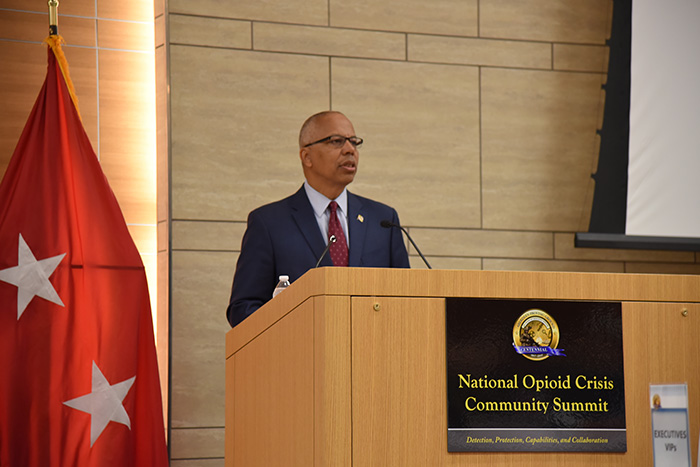USAMRMC Participates in Opioid Crisis Community Summit

Experts from the U.S. Army Medical Research and Materiel Command participated in the National Opioid Crisis Community Summit at Aberdeen Proving Ground in Edgewood, Maryland, on Sept. 7.
The Army is partnering with the state of Maryland to fight the opioid crisis in the area. Commander of U.S. Army Communications-Electronics Command and APG Maj. Gen. Randy S. Taylor hosted the summit at the U.S. Army Medical Research Institute of Chemical Defense, which is a USAMRMC subordinate command and is the Nation's leading science and technology laboratory in medical chemical countermeasures research and development.
"When I first came to APG, I was caught off guard by the community's desire to talk about the opioid crisis," shared Taylor. "This is an epidemic that hits all of us. The security of APG starts long before you hit the gates. It starts with our neighbors in the community. It starts with the village."
President Donald Trump declared the opioid crisis a national emergency on Aug. 10. According to the Centers for Disease Control and Prevention, opioids killed more than 33,000 people in 2015, more than any year on record. Nearly half of all opioid overdose deaths involve a prescription opioid. According to experts at the summit, opioid addiction impacts all demographics and does not discriminate.
Taylor explained that every chemical known to man that can cause harm is studied at the USAMRICD and other commands on APG, where countermeasures are then developed. He vowed that he will share some of the Army's lessons and expertise and will solicit feedback from the community.
Maj. Gen. Barbara R. Holcomb, commander of the USAMRMC and Fort Detrick, spoke at the event about the Army's perspective on the topic. Holcomb discussed alternative pain management strategies that the Army has used to help treat Soldiers that experienced pain and the research that the Army has been working on for more than a decade.
Holcomb shared that although she is speaking as a representative of Army Medicine, it is known that the opioid addiction problem recognizes no distinction between those who wear the uniform and those who do not and the importance of Army research into pain management.
"Army Medicine has been looking closely and developing a strategy for pain management for more than a decade," said Holcomb. "We recognize there are complex clinical and social consequences with chronic pain, and we are deeply concerned about the reduced quality of life for those who abuse opioids and consequences for their families and friends."
Also speaking at the summit were USAMRICD Commander Col. Margery Hanfelt, Maryland Lieutenant Governor Boyd K. Rutherford, Harford County Executive Barry Glassman, as well as others from the Federal Bureau of Investigation, U.S. Drug Enforcement Administration and the community.
"I believe we will find great value in today's discussions," said Holcomb. "We need to carry today's thoughts outside into the community to continue to encourage action in addressing the opioid crisis."
 An official website of the United States government
An official website of the United States government
 ) or https:// means you've safely connected to the .mil website. Share sensitive information only on official, secure websites.
) or https:// means you've safely connected to the .mil website. Share sensitive information only on official, secure websites.


